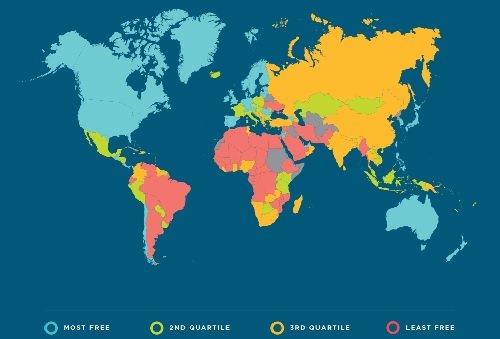
The Fraser Institute released its annual “Economic Freedom of the World” report this morning. The free market think tank rates every nation based on its “degree of freedom in five broad areas”:
- Area 1:Size of Government—As spending and taxation by government, and the size of government-controlled enterprises increase, government decision-making is substituted for individual choice and economic freedom is reduced.
- Area 2:Legal System and Property Rights—Protection of persons and their rightfully acquired property is a central element of both economic freedom and civil society. Indeed, it is the most important function of government.
- Area 3:Sound Money—Inflation erodes the value of rightfully earned wages and savings. Sound money is thus essential to protect property rights. When inflation is not only high but also volatile, it becomes difficult for individuals to plan for the future and thus use economic freedom effectively.
- Area 4:Freedom to Trade Internationally—Freedom to exchange—in its broadest sense, buying, selling, making contracts, and so on—is essential to economic freedom, which is reduced when freedom to exchange does not include businesses and individuals in other nations.
- Area 5:Regulation—Governments not only use a number of tools to limit the right to exchange internationally, they may also develop onerous regulations that limit the right to exchange, gain credit, hire or work for whom you wish, or freely operate your business.
This year, researchers also adjusted the ratings based on gender disparity: formal laws denying women economic rights on the basis of their sex. This year’s results drew on data from 2015.
Overall, global freedom plunged after holding steady for much of the previous decade.
The United States and Canada tied for eleventh place. Although the U.S. improved modestly from 16th place in last year’s report, it ranked second in 2000. Canada tied for fifth place last year.
The 10 most economically free nations were:
- Hong Kong
- Singapore
- New Zealand
- Switzerland
- Ireland
- The United Kingdom
- Mauritius
- Georgia
- Australia
- Estonia
The 10 least economically free nations include:
- Venezuela
- Central African Republic
- Republic of Congo
- Algeria
- Argentina
- Libya
- Syria
- Myanmar
- Chad
- Iran
The Fraser Institute does not rank some nations, including North Korea and Cuba, due to a lack of data.
According to the report, the most economically stifling nation in Europe is Ukraine, at 149, just one notch above Iran.
Other European nations’ rankings include: Lithuania (13), Denmark (15), Latvia and Finland (tied at 17), the Netherlands (19), Romania (20), Malta (21), Germany (23), Norway (25), Austria (26), Sweden (37), Albania (32), Portugal (34), Spain (36), Czech Republic (42), Belgium (43), Bulgaria (48), Poland (51), France (52), Slovakia (53), Hungary and Italy (tied at 54), Iceland (62), Macedonia (67), Croatia (72), Slovenia (73), Serbia (86), Bosnia and Herzegovina (99), Russia (100), and Greece (116).
In addition to the report, the institute’s website features an interactive map, displaying each nation’s ranking and overall score.
The steepest decrease in freedom between 2000 and 2015 came in Venezuela, Argentina, Bolivia, Iceland, and Greece. The largest gains came in Romania, Bulgaria, Rwanda, Albania, and Cyprus.
Why it matters
Aside from the wealth generated by free markets, economic freedom is intimately linked with religious and political liberty. In Freedom House’s ranking of political freedom – including freedom of the press – all 10 of the freest economies are rated “free” or “partly free” politically. Only two of the bottom 10 are (Argentina and Myanmar).
Religious liberty, as ranked by the Pew Research Center in 2015, yielded similar results. Only one of the freest economies, Singapore, imposed a “high” or “very high” level of government restrictions on religious liberty. Half of the most restrictive economies did.
As Friedrich Hayek wrote, “Totalitarianism is nothing but consistent collectivism.” Concentrating economic power in the hands of the state often precedes the eradication of religious freedom.
You can read the full report here.
(Photo credit: The Fraser Institute.)

